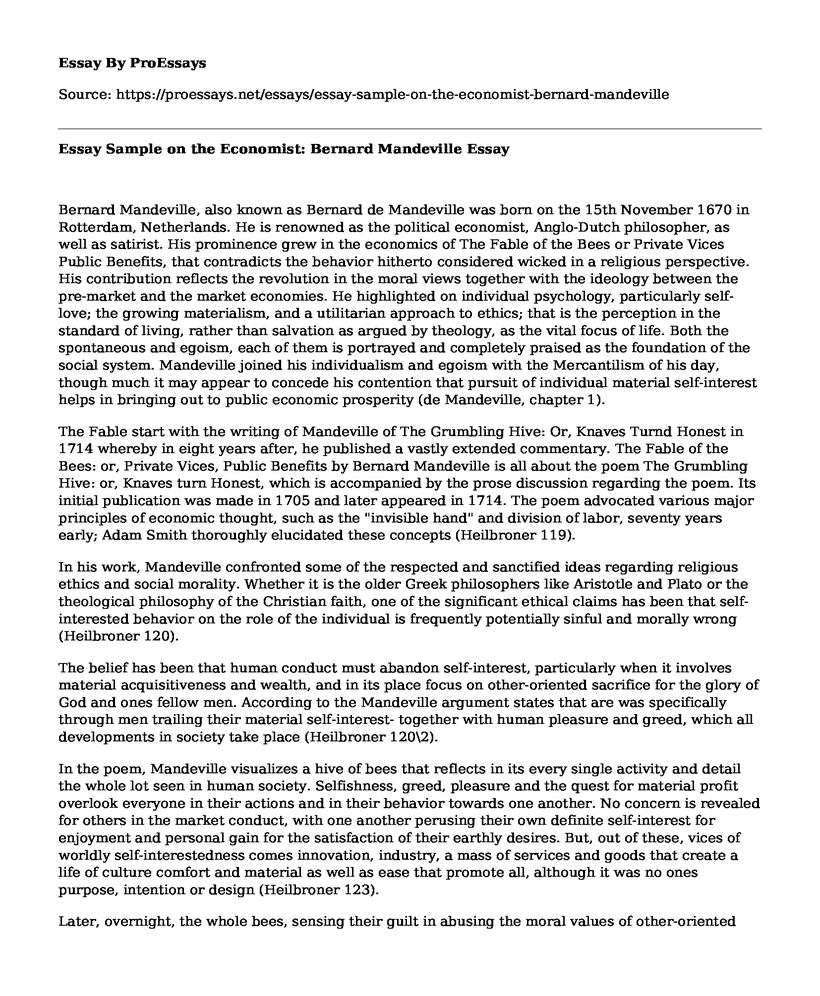Bernard Mandeville, also known as Bernard de Mandeville was born on the 15th November 1670 in Rotterdam, Netherlands. He is renowned as the political economist, Anglo-Dutch philosopher, as well as satirist. His prominence grew in the economics of The Fable of the Bees or Private Vices Public Benefits, that contradicts the behavior hitherto considered wicked in a religious perspective. His contribution reflects the revolution in the moral views together with the ideology between the pre-market and the market economies. He highlighted on individual psychology, particularly self-love; the growing materialism, and a utilitarian approach to ethics; that is the perception in the standard of living, rather than salvation as argued by theology, as the vital focus of life. Both the spontaneous and egoism, each of them is portrayed and completely praised as the foundation of the social system. Mandeville joined his individualism and egoism with the Mercantilism of his day, though much it may appear to concede his contention that pursuit of individual material self-interest helps in bringing out to public economic prosperity (de Mandeville, chapter 1).
The Fable start with the writing of Mandeville of The Grumbling Hive: Or, Knaves Turnd Honest in 1714 whereby in eight years after, he published a vastly extended commentary. The Fable of the Bees: or, Private Vices, Public Benefits by Bernard Mandeville is all about the poem The Grumbling Hive: or, Knaves turn Honest, which is accompanied by the prose discussion regarding the poem. Its initial publication was made in 1705 and later appeared in 1714. The poem advocated various major principles of economic thought, such as the "invisible hand" and division of labor, seventy years early; Adam Smith thoroughly elucidated these concepts (Heilbroner 119).
In his work, Mandeville confronted some of the respected and sanctified ideas regarding religious ethics and social morality. Whether it is the older Greek philosophers like Aristotle and Plato or the theological philosophy of the Christian faith, one of the significant ethical claims has been that self-interested behavior on the role of the individual is frequently potentially sinful and morally wrong (Heilbroner 120).
The belief has been that human conduct must abandon self-interest, particularly when it involves material acquisitiveness and wealth, and in its place focus on other-oriented sacrifice for the glory of God and ones fellow men. According to the Mandeville argument states that are was specifically through men trailing their material self-interest- together with human pleasure and greed, which all developments in society take place (Heilbroner 120\2).
In the poem, Mandeville visualizes a hive of bees that reflects in its every single activity and detail the whole lot seen in human society. Selfishness, greed, pleasure and the quest for material profit overlook everyone in their actions and in their behavior towards one another. No concern is revealed for others in the market conduct, with one another perusing their own definite self-interest for enjoyment and personal gain for the satisfaction of their earthly desires. But, out of these, vices of worldly self-interestedness comes innovation, industry, a mass of services and goods that create a life of culture comfort and material as well as ease that promote all, although it was no ones purpose, intention or design (Heilbroner 123).
Later, overnight, the whole bees, sensing their guilt in abusing the moral values of other-oriented behavior and selflessness, reject the quest of material pleasures. They began living ordinarily, moral lives reflecting nothing of themselves and their individual desires. Although, production breaks, innovation, demand for goods fall, and improvement disappears and work and employments are gone. The society turns poor, stagnant, backward and culturally empty.
The moral drawn by Mandeville from his account was that wealthy, prosperous and great societies only rise from the self-interested desires of men, and that is what made for productive civilizations. Yet, insofar as Mandeville was involved, he perceived himself to be just arousing the reality of human nature and the working of incentives and self-interest in society as the motivational basis for the source of human progress and human association and improvement (Heilbroner 124).
Men questing for their personal desire; each one inventing ways to satisfy and serve the material demands and desires alongside the desire of their neighbors as the way of getting wealth to develop their own fancies and wants; these were all vital factors and human forces promoting ingenuity, innovation, and industry, the increasing result that was the great wealth and wonders for the flourishing society. No one devised this material wealth or its additional cultural wonders. It arises as the unintentional consequences of men left free to develop their own inclinations and individual interests.
The Fable of the Bees is fairly transparent. The bees that Mandeville describes lived like men and executed all their actions in small. When he republished his poem, he illustrated in his Preface that the aim for his amplified version was to modify the misunderstanding of numerous readers who willingly or ignorantly misunderstood the poem and who viewed it as a satire upon virtue and morality, composed (de Mandeville, chapter 2).
Works Cited
de Mandeville, B. (1724). The fable of the bees.
Heilbroner, Robert L. "The Worldly Philosophers." The Great Economic Thinkers (1955), p.119-129
Cite this page
Essay Sample on the Economist: Bernard Mandeville. (2021, Jun 18). Retrieved from https://proessays.net/essays/essay-sample-on-the-economist-bernard-mandeville
If you are the original author of this essay and no longer wish to have it published on the ProEssays website, please click below to request its removal:
- Globalization and Its Profound Implication on the Domestic Employment
- The Importance of Youth Entrepreneurship Essay
- Global Health Diplomacy Paper Example
- Essay Sample on International Monetary Economics
- Issues Relating to Foreign Business Operations in South Africa Essay Example
- Employment Security: Analysis of Outside Sources & Public Policies - Essay Sample
- Essay Example on Economic Crisis in US: IOUSA & Global Financial Meltdown







